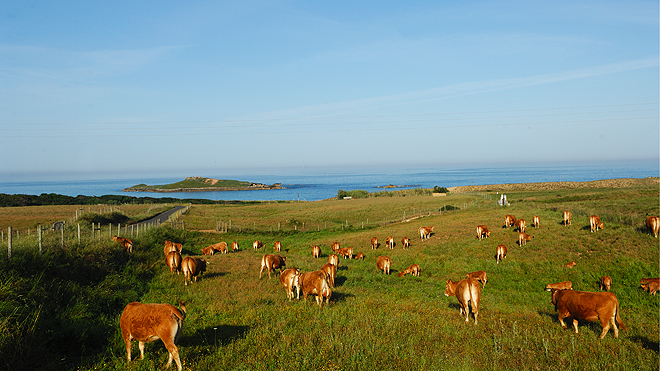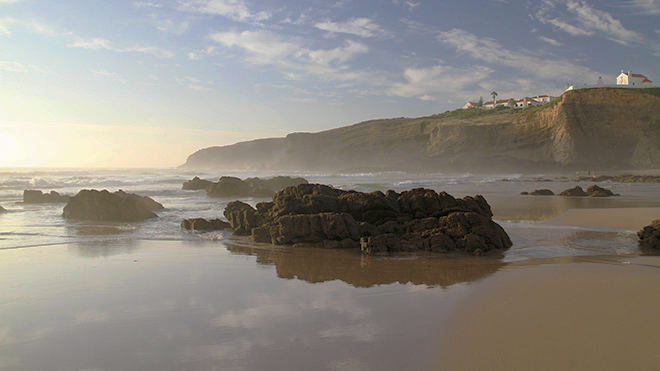The Alentejo coast stretches from the mouth of the River Sado to Zambujeira do Mar, and will surprise you for being such a well preserved coastal area, with small havens of sun and beach, hospitable people and good cuisine.
From Troia to Sines
You can reach Troia via Alcácer do Sal or by ferry from Setúbal, crossing the River Sado estuary. On arrival, the Troia peninsula offers much to be explored. You can play golf, have surfing lessons, walk along the beach or watch the dolphins. You can also wander about to discover the region’s cultural heritage, such as the Carrasqueira village on stilts and the Troia Roman Ruins which actually reveal how the area was already rich in natural resources two thousand years ago.
After Troia, Comporta is a much appreciated spot for a family beach outing and has some good restaurants. This is a paddy field area, so rice-based dishes are an unmissable specialty.
Until Sines, the coast is an unbroken strip of sand, with pleasant beaches such as Pinheirinho and Galé. In Melides and Santo André, depending on your wishes and preferences, you may choose between the sea beaches and the lagoons. These are great places for canoeing and windsurfing.
Sines is one of the most important cities on the Alentejo coast and is an industrial port and a cape as well, making it a natural stopping point for visitors to the region. A traditional fishing port, it was here that Vasco da Gama, the great navigator, was born. Who knows, his travels may have inspired the Festival Músicas do Mundo, the world music festival that is held here annually in early summer.
From Sines to Zambujeira do Mar
From the port of Sines, the natural sandy paradise changes and the smooth bays alternate with more scenic beaches with rock formations. Among these, the São Torpes, Morgável and Vale Figueiros beaches deserve a longer stop with the family. The great wealth of the subaquatic landscape of this area is also much appreciated for diving.

Along the tracks to the beach, you will find small places to eat fish in little villages overlooking the sea, like Porto Covo, a picturesque fishing village that welcomes you to a pretty square surrounded by low houses. The beach is very convivial and from its small port, with its colourful boats, you can reach the island of Pessegueiro opposite, visible out to sea.
Continue to Vila Nova de Milfontes, at the mouth of the River Mira. We suggest exploring around the ocean beach and the river by boat or canoe, with friends. You can even go up river to Odemira.
Almograve, amongst the cliffs and red dunes, is a sanctuary and one of the most appreciated beaches for surfing and body boarding. You can walk through the countryside to the beach from the town, past million-year old dunes and rock formations.
Further south, the Sardão Cape is a wild spot, but also a breathtaking lookout point over the jagged coast. It is the only place in the world where the white stork nests on the cliffs.
This inspiring tour continues to Zambujeira do Mar, with other beaches to be discovered. Here, like along the whole coast, surfers will find perfect waves to refine their style and have fun.

But the Alentejo coastline is not only beaches. To the south of Sines, you enter the Parque Natural do Sudoeste Alentejano e Costa Vicentina (Southwestern Alentejo and Vicentina Coast Natural Park), abounding in hiking and mountain bike trails to choose from. The various marked trails along the 450km which make up the Vicentina Route, between Santiago do Cacém and São Vicente Cape, are a good way to get to know the region, come into contact with the everyday life of its residents and have other experiences of the local customs and traditions.
@ Visit Portugal


